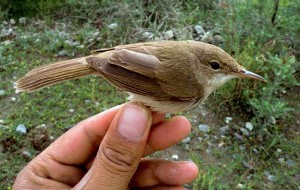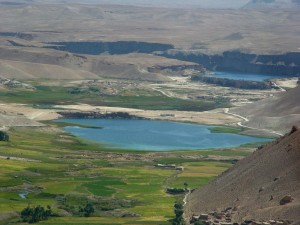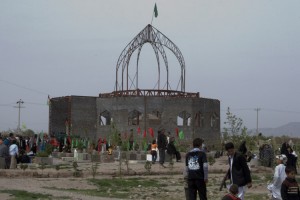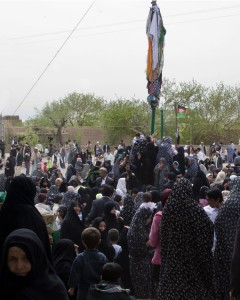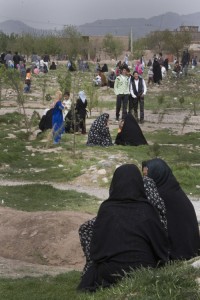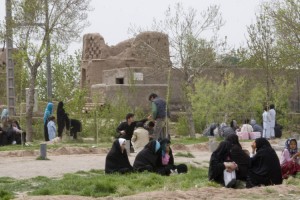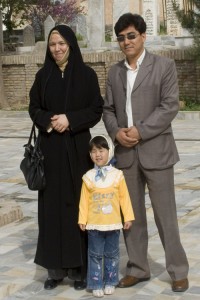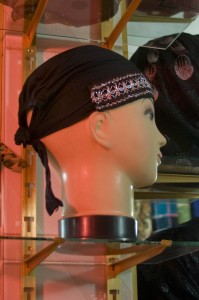Archive for April, 2010
The Peace Jirga
Friday, April 23rd, 2010
The London Conference, which took place in January of this year to chart a new course for the future of Afghanistan, established a Council Circle (jirga) about Peace, scheduled to take place in early May. (It’s since been postponed to the end of the month.) Fifteen hundred of Afghanistan’s tribal elders and other community leaders are to be brought together (paid for by the UN) to create a formula upon which peace can be built. In order to establish meaningful peace, all parties would need to be involved, including militants of different varieties.
The reaction of the Afghan Women’s Network was to host an Afghan Women’s Forum on April 3rd where influential women from all over the country came together to discuss the participation of women in the Peace Jirga. There were lots of nice speeches but in the Q&A afterwards, when asked how women should be included, one male panel member suggested that women select one representative to be present at the Peace Jirga to let the participants know what women think. This, of course was shot down by the audience, and in the end, he agreed that 30% of the attendees to the jirga should be women. What else could he say? He was only a representative for the minister who hadn’t attended. If he truly supports significant female involvement, he will have to push for it. Otherwise, he could let it sit on the back burner and nothing would come of it while he could still claim to be “supportive”. The position of the Forum was that women should also be substantially involved in each of the “clusters” (of ministries) which would lay the groundwork for the jirga.
Vic Getz,(1) who has been involved in Afghanistan for five years and living here for three has this to say about the Peace Jirga:
“If these media photo ops are happening at taxpayer (I mean around the world) expense, then we must create mechanisms to invest in parallel conferences that provide alternative points of view. …to be constrained by the powers that invest (??) in Afghanistan is unacceptable. Fund the Parallel Peace Jirga….start it now. Where is the money for these kinds of initiatives? Where is the support? – Because I KNOW, that the people, ideas, intelligence, understanding (far more nuanced than you could ever believe), networks and energy are here. Now. Today.
If I had the money, I would fund it myself – just to show the world the Afghanistan that I know exists here. Now that’s a photo op I could believe in.”
I’ve been asking my interviewees their opinion of “negotiating with the Taliban”. The responses seem to be divided into two classes. The “normal people” (both those who left and those who suffered under the Taliban) have mostly said that you can’t trust them, that they are all against education for girls and that if they are allowed into the government, the situation will return to what it was before. The women who are members of Parliament or leaders of some women’s groups say that if Talib individuals are to become part of the government, then they must abide by the rules of the constitution in which women’s rights are clearly stipulated. And so they think that it’s not a bad idea and that it might have a chance of bringing peace.
One mistake that I see in this discussion is the assumption that all Talibs are the same and that they are unchangeable. Even under their previous rule, there were different strains of them under different leaders. Some were more ideologically motivated, others were members because they needed the pay, others because they were supported by Pakistan. Now there is also talk of them having changed their tune a bit. Mullah Omar released a statement last fall saying that “the Taliban do not oppose women’s rights and favor education for all”.
Tajwar Kakar told me this story when I interviewed her in 2003 talking about the time when she was headmistress of a school for boys in 2000 under the Taliban.
“The next day the religious police came to my office and I asked them what they want. They said that they heard that I have one room where you put pictures. I opened the door and showed them the two walls of pictures, one group of pictures of the city before the war and the other of the destroyed city. Look, I said, who destroyed our country? Who made you poor? Who made you uneducated? Before the war, you had a good life and there were nice buildings. Now it is not your responsibility to take your stick and punish the woman. Now you should build up your country. I put these pictures to put in their minds who destroyed their country and what it is their responsibility to do.… What are you doing now? Have you come to punish me? He said ‘you did nothing wrong’. How old are you ? ‘We’re 18, 19 and 20.’ How will you rebuild Afghanistan? With this stick you have? Islam doesn’t teach you to punish the women. Then one asked: ‘Is it possible for us to come every day for a half hour and you will teach us?’ They had come to punish me. But that was my work.”
Hanifa Safia, the women’s-affairs representative for the province of Laghman, says that she thinks “a settlement is the only way to peace. The Taliban fighters who throw acid on schoolgirls’ faces or threaten professional women do so just to antagonize the government. I have talked to so many Taliban. They are not against women,” Safia said. “Once they have been given positions in government, they will definitely change.” (2)
On the other hand, Hekmatyar’s organization, Hezb-e-Islami, the second largest insurgent group, is calling for the replacement of the current Afghan parliament with an interim government which would, after new elections, rewrite the constitution. Scary.
As far as women being forced to stay home and being denied education and human rights, the biggest factor is the families. Now, at a time when the government gives women all of these things, many fathers, husbands, brothers and even sons deny them to their women. It is important to have the legal rights and educational opportunities, but the real work of social change must happen on an individual level and must be seen from a generational perspective.
One powerful force (especially in Afghanistan) in this endeavor is Islam. The rights for all of these are given in the Koran. Already much progress is being made through education, basing the good treatment, respect, education and involvement of women in society on Islamic scriptures.
1 Vic Getz,PhD, is an Environmental Sociologist/Gender and Development Specialist and founder of the Afghan Gender Cafe (UPGRADE coming soon)
To join the AWRL (Afghan Women’s Rights List) network, email Vic at vgetz@moscow.com
2 By Karin Brulliard The Washington Post
Posted in Afghan Women's Project, AWP 2010, education, Other, political | 1 Comment »
Afghan Women Writers
Friday, April 16th, 2010
The Afghan Women’s Writing Project offers a way to support Afghan women emerging writers in a delightful, eye-opening and very meaningful way.
Novelist Masha Hamilton began this project to give voice to Afghan women. The deteriorating opportunities for women from her first visit in 2004 until her return in 2008, inspired her to create a project where women could share their thoughts from the safety of their own homes, unfiltered by family members or the media.
Women who join the project are mentored, via back and forth emails, as they polish the writing of their experiences. Many of them participate in secret. Their mentors, female authors and teachers, volunteer on a rotating basis. Writing workshops are taught in online classrooms.
I have met and interviewed several women in this project and will be sharing some of their life stories in my presentations upon my return. Some of the most promising of these writers have told me that they came to believe in their writing abilities due to the supportive comments left by readers on the pages of the website. These poems, short stories and essays provide a window into the lives of Afghan women that we would not have otherwise.
For example, one woman writes:
Let the world know
I am a poem.
My soul is crazy.
no matter what happens next,
no matter if no one reads the verse of my mad thoughts,
no matter if dust covers my poetry papers,
I am a poem.
I write about the waves of my soul’s water.
My poem tastes like a glass of black tea
when you are tired.
It is the spice of my lunch every day.
My poem sounds like the sky singing in summer,
like rain in the spring.
My poem sounds like
parrots talking, sparrows chatting
in a lonely tree in the valley.
I bloom, bloom, bloom.
When I write about mirrors
pain, life, tea, sparrows, eyes,
I write, write, write.
No matter that, in her hands, Nature
has a hammer, leveled
at my head, poised to kill my poem.
I don’t give up.
I am a poem.
By Roya
And another:
While the schools Burn
“I am burning,”
says the school.
“Who will save me?”
cries the school.
“Where are my students,
the teachers, our friends?”
“Why do the Taliban burn me?”
They are not literate.
Students fear.
Teachers receive threats,
get kidnapped, beheaded.
Friends, families fear.
Unread books are sad.
They too, burned
by guns that write with fire.
Knowledge, understanding
grieve.
Is there anyone
any organization
any country
any international society
who will help us overcome our loss,
this war,
our Afghanistan?
We wait, hope, want.
Please, help us
invite the return of knowledge.
By Freshta
Below is an excerpt from an essay written by a woman returning to her home in Mazar Sharif:
Who Will Stop The Crimes?
…After leaving Fatema’s house, I saw a small girl trying to clean a car. People on the street were laughing at her. I thought: Why is she on the street? Why isn’t she studying instead? How can I take them out of the darkness? I know I alone can’t do anything, but we as a people must start anew. We should never let any girl be a victim of her family. We must give women the courage to let their voices be loud and to know their value. We must not ignore women when they talk about their rights.
Who will stop these crimes against women? Who will hear our voices? Who will hold our hands and take us out of the darkness? Who can hear the meaning of our tears? Who will bring peace to those who are begging on the streets?
For all the questions, I have one answer—unity. Our country is one of the poorest in the world because women live like slaves and do not participate in society. We as a people have forgotten to value each other as human beings. We are all equal. It is our combined hands that can destroy or build our country. If we do not try, nobody will help us.
By Shogofa
And another excerpt from
The Blaming Game
…Now my heart wants to shout directly into the ears of my people: “For Allah’s sake, stop blaming others for our miseries and problems.” I want to reach out to millions of Afghans, President Karzai included, and tell them: “We have had enough of the blaming game. Let’s not play it anymore. Let’s take responsibility for our own actions and our own faith, for our people cannot take any more pain of dirty politics and lies.
By Meena
You can help by commenting on the writings and donating money for flash drives and netbook computers. Your generosity can help open prison doors.
Posted in Afghan Women's Project, AWP 2010, education, Other, writers | Comments Off on Afghan Women Writers
How can this unassuming little bird help preserve local culture and keep the peace in a remote corner of Afghanistan?
Saturday, April 10th, 2010
The Global Exchange group and I met with Dr. David Lawson of the World Conservation Society (WCS) in their small office here in Kabul. I was surprised to learn that conservation here in Afghanistan has wide ranging effects beyond just saving wildlife. It’s not a matter of choosing to help cute fuzzy critters over people. Quite the opposite, in fact.
In the early 1500’s, during the time of the emperor Barbur, Afghanistan was a garden country. Since then, population increases and recently, 30 years of war have devastated the environment. In 1977, 40% of the land was covered with trees. By 2002, that percentage had decreased to 10%. The Soviets destroyed a large number of trees, but additionally, the needs of households for fuel and the high value of some of the timber combined to decimate the tree cover.
Eighty percent of Afghans rely directly on their natural resources for survival, so as these resources are depleted and the effects of the depletion cause even further destruction, society is heading towards social instability and even resource conflicts as people do whatever they need to in order to feed their families.
Even so, Afghanistan retains an amazing biodiversity. The same number of species found in the entirety of sub Saharan Africa is found in the Wakhan Corridor, the panhandle that extends eastward and borders Tajikistan, China and Pakistan. Endangered species include the Marco Polo Sheep, the Siberian Ibex, and the Snow Leopard. (There are approximately 120 snow leopards left in the world) not to mention the Large Billed Reed Warbler. Afghanistan has the largest number of natural varieties of grapes of anywhere in the world. This biodiversity indicates that the environment in these unique landscapes is still healthy.
When the environment is healthy, the cultures that live in them can be preserved and with well thought out assistance, the warbler can help.
WCS’s Afghan 70 staff have already been working in the Wakhan, doing community trainings resulting in 1200 out of 1600 households joining the Pamir Association. Along with so many members comes political clout and a realistic possibility of passing laws to protect their area. Locals are hired as rangers who, without carrying guns, stop people from hunting and set camera traps to monitor the wildlife. Part of the development includes a school program where WCS sponsors 13 schools giving the students an environmental awareness within the curriculum. In the remote High Pamirs, (accessible only by foot and by yak) the schools are in tents and teachers are sent in only for the summer.
All of this leads to developing tourism, which can increase the wealth of the area and preserve the cultures if done right. With the photographs from the camera traps and wide community support, the Pamir Association can encourage the parliament to pass laws giving exclusive tourism rights to the Association, which can manage the professional tourism companies. This way, the tourist money can be used for the good of the communities and to make their projects sustainable. The people seem to understand that the more Marco Polo sheep they have, the more visitors will come and the more money the community will receive.
Band-i-amir Lake, 2003
The lakes of Band-e-Amir comprise the first National park of Afghanistan, established just last year. The park and the nearby area of Bamiyan are host to 126 different species of birds. At present, the park employs 20 trained tourist guides to this beautiful and safe area of the country. My plan is to visit it myself in May.
Posted in Afghan Women's Project, AWP 2010, environment | Comments Off on How can this unassuming little bird help preserve local culture and keep the peace in a remote corner of Afghanistan?
Herat part 2
Friday, April 2nd, 2010
For the Hazara ethnic group in Herat, Now Ruz, the Persian and Afghan new year, was celebrated at the shrine of Said Mustafa. People go there throughout the year to pray for cures and this is the focal place of their Now Ruz activities
We arrived a half-hour late for the ceremony where they moved a pole of flags from one stand to another.
By the time we arrived many had already left, but others were hanging out in the graveyard on the property.
It was interesting that there were only a few burkas here and there in this very conservative city. Most of the women wear the Iranian Chador or a more modern chador-like outer garment.
When I was in Iran in the ‘70’s, women just wore the Chador, a half circle of cloth that goes from the top of the head to the ground. Here and now, they wear a little cap underneath.
Later in the day we went to a mini-mall mostly full of shops selling evening ball gowns,
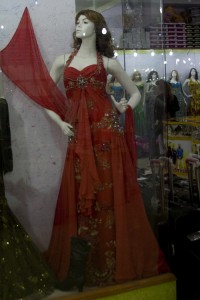
jackets (for modesty), Chador cloth and lounge wear. It was so odd to see those things selling side by side. Inside one shop, my companions wanted to try on one of the jackets in the window, so the sales clerk obligingly pulled one of the manikins out of the window display by putting one hand in her crotch and the other on the shoulder. Then he disrobed her, handing the jacket to my friend to try on, leaving the blue jean-clad but bare breasted model out for the entire rest of the time we were in the shop.
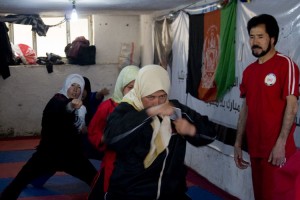
I’ve encountered other contradictions to “common understandings” here and there. The other day I interviewed five students from a Tai Kwan Do class taught by a male instructor. This fellow has taught over 700 girls in his tiny dojo, with some of them wining prizes in international competitions. He instructs them all for free, earning his living from teaching the boys. Some of these girls heard about the class and asked their parents for permission, but in other cases, the parents found out about the class and encouraged their daughters to join, in spite of having a male instructor. I had come across these girls performing (and being filmed for TV) at a Women’s Day event and chased them down for an interview.
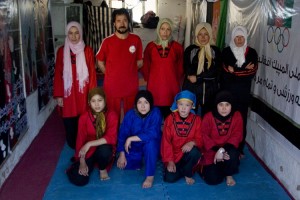
I also interviewed Elaha Surur, a former contestant on Afghan Star. (It’s the Afghan version of American Idol.) She talked about the negative repercussions her TV performance had on her family, how most of her relatives no longer speak to her parents. She now lives in a 3-room house with her sister. When I arrived for the interview, her “friend” was there and he filled in bits and pieces in the interview. Later, when I asked her to sing, she called another friend to accompany her on guitar.

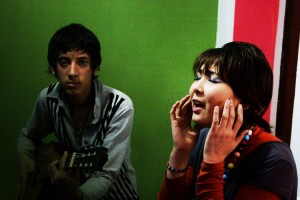
Posted in Afghan Women's Project, AWP 2010, Other, women | 1 Comment »
